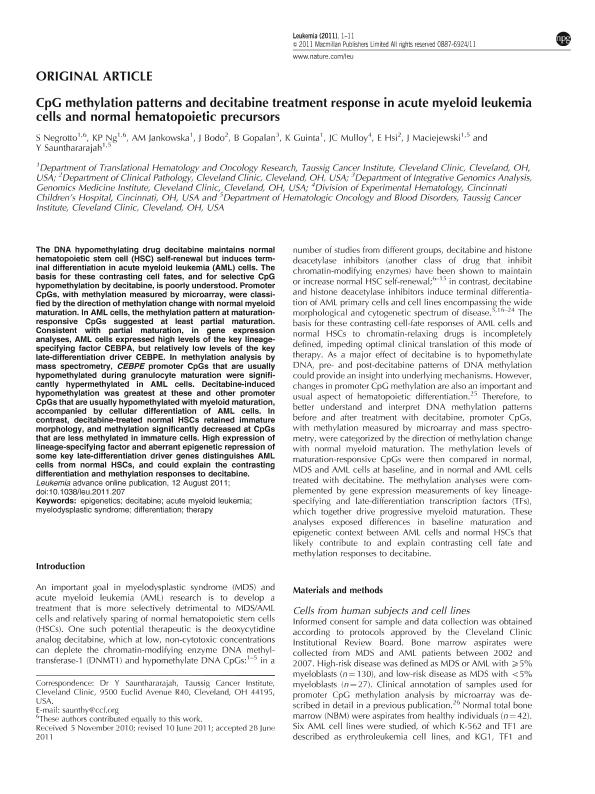Artículo
CpG methylation patterns and decitabine treatment response in acute myeloid leukemia cells and normal hematopoietic precursors
Negrotto, Soledad ; Ng, K .P.; Jankowska, A. M.; Bodo, J.; Gopalan, B.; Guinta, K.; Mulloy, J.C.; Hsi, E.; MacIejewski, J.; Saunthararajah, Y.
; Ng, K .P.; Jankowska, A. M.; Bodo, J.; Gopalan, B.; Guinta, K.; Mulloy, J.C.; Hsi, E.; MacIejewski, J.; Saunthararajah, Y.
 ; Ng, K .P.; Jankowska, A. M.; Bodo, J.; Gopalan, B.; Guinta, K.; Mulloy, J.C.; Hsi, E.; MacIejewski, J.; Saunthararajah, Y.
; Ng, K .P.; Jankowska, A. M.; Bodo, J.; Gopalan, B.; Guinta, K.; Mulloy, J.C.; Hsi, E.; MacIejewski, J.; Saunthararajah, Y.
Fecha de publicación:
02/2012
Editorial:
Nature Publishing Group
Revista:
Leukemia
ISSN:
0887-6924
Idioma:
Inglés
Tipo de recurso:
Artículo publicado
Clasificación temática:
Resumen
The DNA hypomethylating drug decitabine maintains normal hematopoietic stem cell (HSC) self-renewal but induces terminal differentiation in acute myeloid leukemia (AML) cells. The basis for these contrasting cell fates, and for selective CpG hypomethylation by decitabine, is poorly understood. Promoter CpGs, with methylation measured by microarray, were classified by the direction of methylation change with normal myeloid maturation. In AML cells, the methylation pattern at maturation-responsive CpGs suggested at least partial maturation. Consistent with partial maturation, in gene expression analyses, AML cells expressed high levels of the key lineage-specifying factor CEBPA, but relatively low levels of the key late-differentiation driver CEBPE. In methylation analysis by mass spectrometry, CEBPE promoter CpGs that are usually hypomethylated during granulocyte maturation were significantly hypermethylated in AML cells. Decitabine-induced hypomethylation was greatest at these and other promoter CpGs that are usually hypomethylated with myeloid maturation, accompanied by cellular differentiation of AML cells. In contrast, decitabine-treated normal HSCs retained immature morphology, and methylation significantly decreased at CpGs that are less methylated in immature cells. High expression of lineage-specifying factor and aberrant epigenetic repression of some key late-differentiation driver genes distinguishes AML cells from normal HSCs, and could explain the contrasting differentiation and methylation responses to decitabine. © 2012 Macmillan Publishers Limited All rights reserved.
Archivos asociados
Licencia
Identificadores
Colecciones
Articulos(IMEX)
Articulos de INST.DE MEDICINA EXPERIMENTAL
Articulos de INST.DE MEDICINA EXPERIMENTAL
Citación
Negrotto, Soledad; Ng, K .P.; Jankowska, A. M.; Bodo, J.; Gopalan, B.; et al.; CpG methylation patterns and decitabine treatment response in acute myeloid leukemia cells and normal hematopoietic precursors; Nature Publishing Group; Leukemia; 26; 2; 2-2012; 244-254
Compartir
Altmétricas



